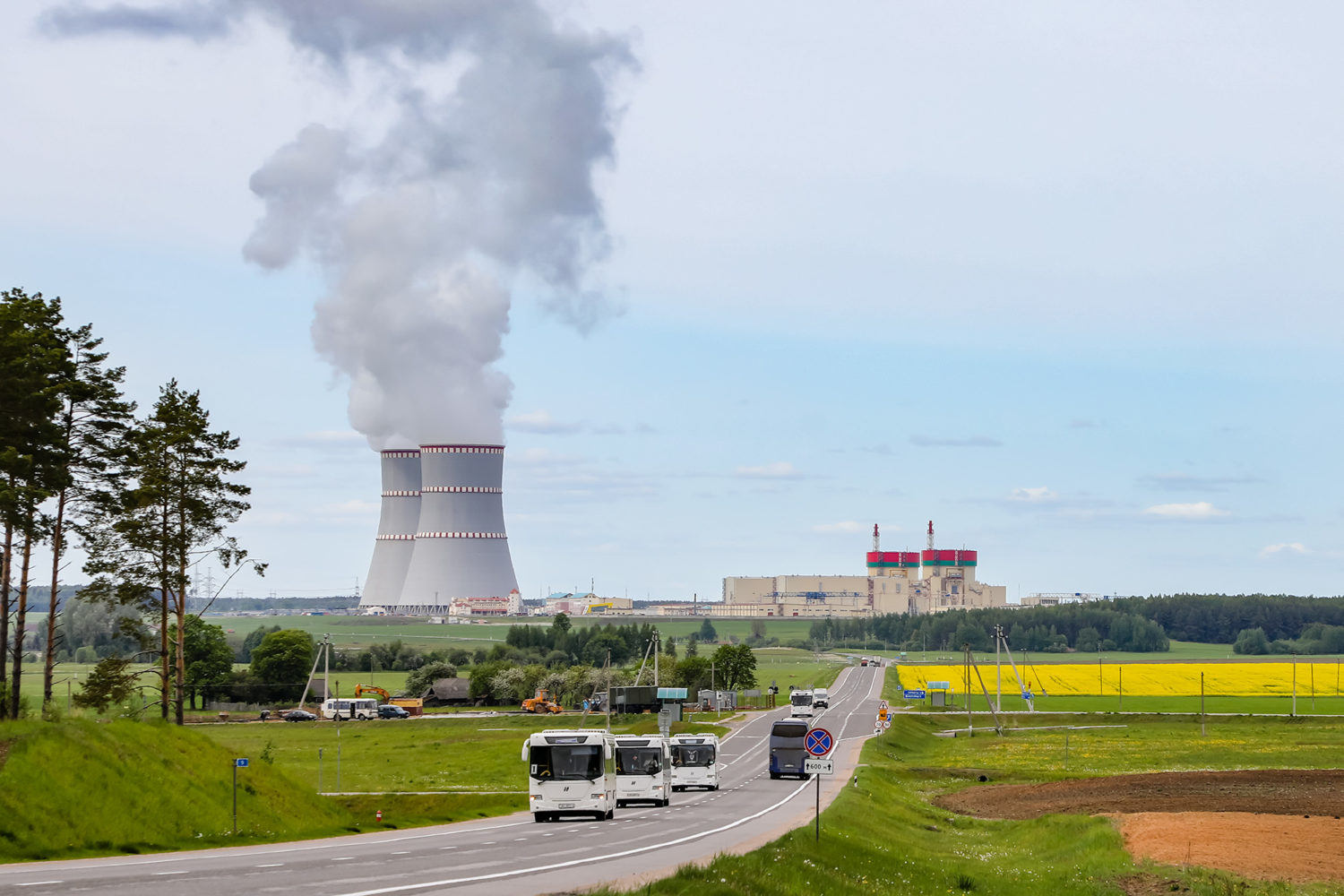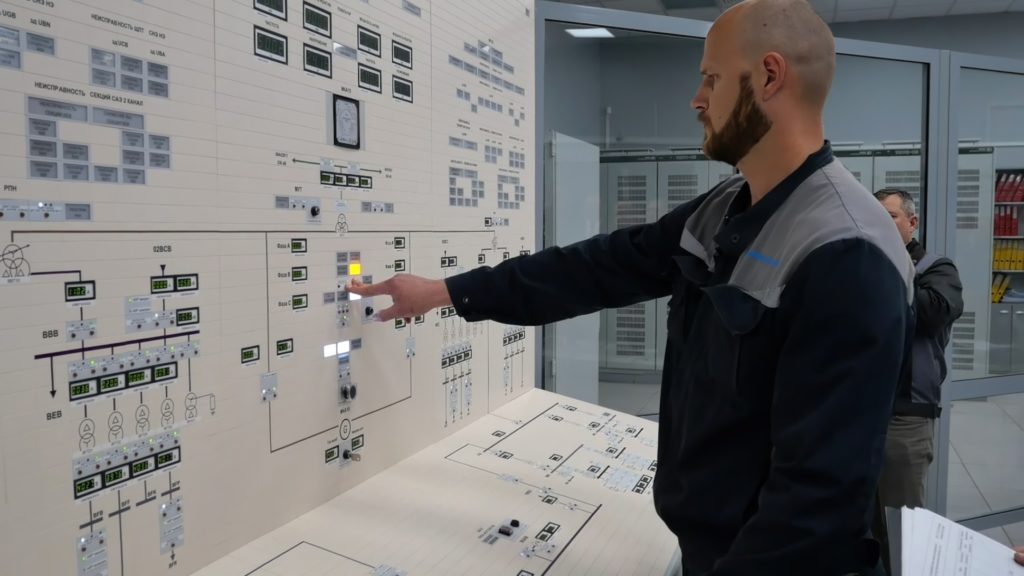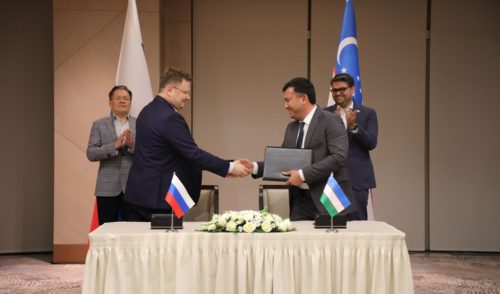
Second Reactor Goes Online in Belarus
back to contentsOn May 13, the second unit of the Belarus Nuclear Power Plant was brought online and supplied the first kilowatt-hours of electricity to the national power grid. From that moment on, the reactor unit has been considered operational according to the IAEA rules. The plant is clearly not the only example of cooperation between Rosatom and Belarus in nuclear technology.
The reactor was connected to the grid at 40 % of nominal power, increased to 50 % six days later. The reactor will gradually be taken to 100 % while conducting dynamic tests in various operation modes, including complete de-energizing of the power unit. During the power ascension process, the plant engineers will compare operating parameters of the nuclear and turbine islands against rated performance.
“The start of power ascension tests means the entire Belarusian NPP construction project has entered the homestretch. The first nuclear power site in brotherly Belarus has laid a foundation for Russia and Belarus to continue their collaboration in the power sector and other economic sectors, including nuclear medicine and digital technology, taking it to new heights,” said Rosatom Director General Alexey Likhachev at the start of power ascension.

Russia and Belarus maintain close contacts across the entire spectrum of civil nuclear operations. Rosatom’s fuel division TVEL supplies fuel for the Belarus NPP. Currently, the plant operates in a four-year refueling cycle with one partial reload every 12 months. However, there is a good chance that the refueling interval will be extended to 18 months. TVEL and the Belarusian NPP have also signed an agreement on scientific and technical support during decommissioning.
Rosatom helps Belarus in training staff for the nuclear industry. As of early 2023, over 20 Belarusian students were enrolled in Rosatom’s backbone universities, majoring in nuclear-related professions sponsored by the Russian nuclear corporation. During the 2022/2023 academic year, another five Belarusian students received scholarships from Rosatom and were enrolled in the National Nuclear Research University (MEPhI) and the Moscow Institute of Physics and Technology (MIPT). Retraining and advanced training programs have also been implemented. In addition, MEPhI and the Belarusian State University of Informatics and Radioelectronics offer joint Master’s programs. During Atomexpo 2022, the Moscow State University Faculty of Chemistry and the Belarusian State University signed an agreement on strategic cooperation in science and education. The priority lies in developing a curriculum focused on spent nuclear fuel management.
Cooperation in nuclear medicine is also expanding. In May, an agreement for the supply of medical equipment and radiopharmaceuticals to Belarus was signed at the Nuclear Medicine in Belarus and Russia: Prospects and Opportunities seminar. The seminar participants also shared their knowledge about the cancer treatment equipment and the use of radiopharmaceuticals.
In April, Rosatom group companies signed three agreements with Belarusian partners at the TIBO 2023 forum. The first agreement was made between JET Engineering and Technical Center on one side, and Belenergo and BelenergoRemNaladka on the other side. The agreement aims to deploy full-scale simulators and promote digital twins at the power generation facilities in Belarus, while also training personnel and implementing best practices in power equipment operation and maintenance.
The second agreement signed by Rusatom Infrastructure Solutions and Giprosvyaz, focuses on the development of Smart City solutions to optimize and digitalize the urban environment, utilities, and transport infrastructure management. For instance, the Digital Water Management system reduces losses in water supply networks and electricity costs, while simultaneously increasing productivity. Earlier, during a visit to Rosatom, the Belarusian delegation was shown how the Navigator nuclear industry management system worked. The system brings together 25,000 users from 328 companies. Neural network models gather and process data to generate predictive analytics and recommendations.
The switchboard equipment manufacturer T-Com and the Belarusian company Promsvyaz signed an agreement on strategic cooperation in the field of telecommunications equipment. The partners plan to develop and test new products and solutions.
RENERA, a lithium-ion storage systems manufacturer, is discussing deliveries of storage batteries for stationary energy solutions. RENERA already supplies the Belarusian company BKM Holding with storage batteries for Olgerd trolleybuses with an increased travel range, including those produced by the Belarusian company for Gorelectrotrans in Saint Petersburg.
Another area of joint interest is additive technology. The parties are considering the possibility of using 3D-printing to create repair parts for the Belarusian power generation facilities.
Finally, Rosatom and Belarus are discussing the prospects of building a research reactor at the Joint Institute for Power and Nuclear Research in the town of Sosny. The terms of an intergovernmental agreement to this effect are currently being negotiated.
Belarus Unit 1 with a VVER‑1200 reactor was connected to the national grid in November 2020. In 2022, it produced nearly 4.7 billion kWh of electric power.




